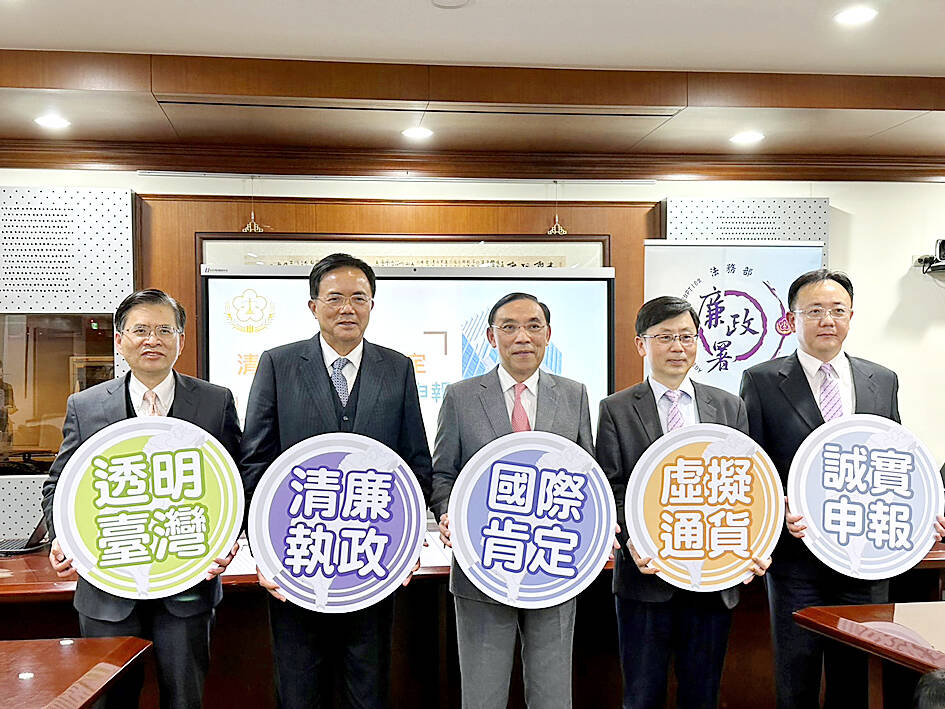Taiwan has maintained its No. 25 ranking in the global Corruption Perceptions Index, showing that its efforts to ensure transparency in governance are being recognized by the international community, Minister of Justice Tsai Ching-hsiang (蔡清祥) said yesterday.
Taiwan scored 68 on the index, outperforming 86 percent of the 180 countries on the list, Tsai told a news conference.
Published annually by Berlin-based Transparency International, the latest index was released on Jan. 31, ranking countries and territories worldwide by their perceived levels of public-sector corruption, scoring them on a scale of 0 (highly corrupt) to 100 (very clean).

Photo: CNA
Denmark ranked first with a score of 90, followed by Finland and New Zealand with 87 each, and Norway with 84.
Countries in the Indo-Pacific region that ranked higher than Taiwan were Singapore at No. 5, Hong Kong at No. 12, Australia at No. 13 and Japan at No. 18.
Regional countries that ranked lower than Taiwan were South Korea at No. 31, Malaysia at No. 61, China at No. 65, Vietnam at No. 77 and the Philippines at No. 116.
“Our efforts to root out corruption, bribery and graft have produced these results for the world to see,” Tsai said.
He called on the Ministry of Justice and law-enforcement agencies to keep up the good work, and encouraged them to help Taiwan catch up with Japan and Hong Kong on transparency and ethics in the public sector.
Tsai said “Taiwan’s ranking in the index has been rising over the past few years,” as it ranked between 29th and 31st places from 2016 to 2018, before improving to 28th place in 2019 and 2020.
The nation then moved up three spots to No. 25 in 2021 and last year.
Tsai attributed the improvement to government crackdowns on corruption, as well as probes by the Ministry of Justice Investigation Bureau and the Agency Against Corruption (AAC), alongside support from other law-enforcement agencies.
The government is committed to complying with the UN Convention Against Corruption, and working with international bodies against money laundering and terrorism financing, he said.
AAC Director-General Zhuang Rong-song (莊榮松) credited the Government Procurement Integrity Platform for the nation’s progress in the rankings.
The platform aims to root out bid-rigging, influence peddling, bribery and kickbacks, as well as the involvement of organized crime in public tenders for major government projects.
Its success in cleaning up corruption in public procurement projects has prompted corporations to work with the AAC and the justice ministry to set up a pilot Integrity Platform for Enterprises Services program to clean up the private sector, Zhuang said.
He said the government has been enforcing the Act on Property Declaration by Public Servants (公職人員財產申報法) that requires civil servants and elected officials — including lawmakers, city mayors and county commissioners, and city and county councilors — to declare their assets, which now includes cryptocurrency and other virtual assets, he said.
That is in addition to tangible holdings including cash, deposits, securities, jewelry, antiques, vehicles, real estate and other forms of investments, he added.
The requirement aims to ensure ethical practices, deter corruption and prevent the acquisition of funds and properties through illegal means, Zhuang said.

Japanese footwear brand Onitsuka Tiger today issued a public apology and said it has suspended an employee amid allegations that the staff member discriminated against a Vietnamese customer at its Taipei 101 store. Posting on the social media platform Threads yesterday, a user said that an employee at the store said that “those shoes are very expensive” when her friend, who is a migrant worker from Vietnam, asked for assistance. The employee then ignored her until she asked again, to which she replied: "We don't have a size 37." The post had amassed nearly 26,000 likes and 916 comments as of this

US President Donald Trump said "it’s up to" Chinese President Xi Jinping (習近平) what China does on Taiwan, but that he would be "very unhappy" with a change in the "status quo," the New York Times said in an interview published yesterday. Xi "considers it to be a part of China, and that’s up to him what he’s going to be doing," Trump told the newspaper on Wednesday. "But I’ve expressed to him that I would be very unhappy if he did that, and I don’t think he’ll do that," he added. "I hope he doesn’t do that." Trump made the comments in

Tourism in Kenting fell to a historic low for the second consecutive year last year, impacting hotels and other local businesses that rely on a steady stream of domestic tourists, the latest data showed. A total of 2.139 million tourists visited Kenting last year, down slightly from 2.14 million in 2024, the data showed. The number of tourists who visited the national park on the Hengchun Peninsula peaked in 2015 at 8.37 million people. That number has been below 2.2 million for two years, although there was a spike in October last year due to multiple long weekends. The occupancy rate for hotels

A cold surge advisory was today issued for 18 cities and counties across Taiwan, with temperatures of below 10°C forecast during the day and into tonight, the Central Weather Administration (CWA) said. New Taipei City, Taipei, Taoyuan and Hsinchu, Miaoli and Yilan counties are expected to experience sustained temperatures of 10°C or lower, the CWA said. Temperatures are likely to temporarily drop below 10°C in most other areas, except Taitung, Pingtung, Penghu and Lienchiang (Matsu) counties, CWA data showed. The cold weather is being caused by a strong continental cold air mass, combined with radiative cooling, a process in which heat escapes from